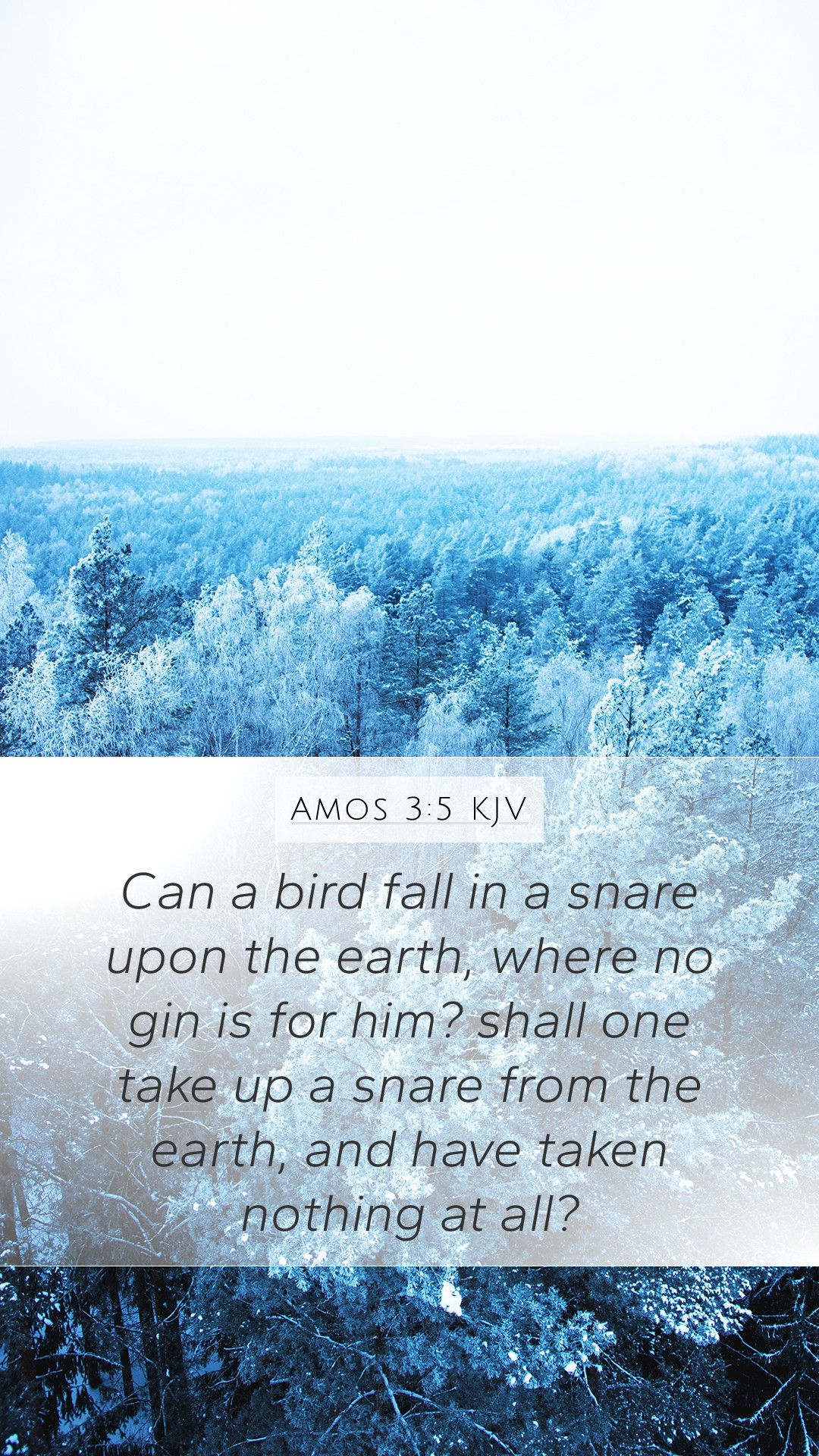Old Testament
Genesis Exodus Leviticus Numbers Deuteronomy Joshua Judges Ruth 1 Samuel 2 Samuel 1 Kings 2 Kings 1 Chronicles 2 Chronicles Ezra Nehemiah Esther Job Psalms Proverbs Ecclesiastes Song of Solomon Isaiah Jeremiah Lamentations Ezekiel Daniel Hosea Joel Amos Obadiah Jonah Micah Nahum Habakkuk Zephaniah Haggai Zechariah MalachiAmos 3:5 Meaning
What is the meaning of Amos 3:5?
Can a bird fall in a snare upon the earth, where no gin is for him? shall one take up a snare from the earth, and have taken nothing at all?
Amos 3:5 Bible Verse Meaning
Understanding Amos 3:5
Amos 3:5 states: "Can a bird fall on a snare upon the earth, where no gin is for him? Shall one take up a snare from the earth, and have taken nothing?" This verse serves as a profound example of the relationship between cause and effect, highlighting God's justice, the certainty of consequences, and the need for discernment in the spiritual realm.
Verse Analysis and Interpretation
The prophet Amos uses the imagery of a bird falling into a snare to illustrate a deeper spiritual truth. Public domain commentaries provide extensive insights into the verse, allowing us to derive a rich understanding of its meaning:
-
Matthew Henry's Commentary:
Henry emphasizes the inevitability of God's justice, stating that just as a bird does not get caught in a trap without there being a trap set, calamities do not occur without God's permission or a divine purpose. This suggests that the consequences for sin are always present and unavoidable.
-
Albert Barnes' Notes:
Barnes draws attention to the necessity of understanding the context of God's judgments. He notes that the verse conveys that divine judgments are not arbitrary; they are a response to the actions and behaviors of the people. The "snare" symbolizes the consequences that await those who disregard God's ways.
-
Adam Clarke's Commentary:
Clarke approaches this verse by discussing the lack of chance in God's dealings. He suggests that just as one can't find a bird in a snare without a snare being there beforehand, so too, individuals cannot experience God's punishment without prior warning or sign of impending judgment. It encourages the reader to reflect on their own behavior and the signs God provides.
Theological Themes
From the combined insights of these commentators, we can identify several key theological themes present in this verse:
- Divine Justice: This verse reinforces the principle that God’s judgment is just and inevitable.
- Spiritual Discernment: Believers are encouraged to practice discernment and mindfulness regarding the consequences of actions.
- God's Sovereignty: Emphasizes God’s control over life events and circumstances, letting us know that nothing happens without His consent or knowledge.
Application of the Verse
How does one apply the insights from Amos 3:5 to their daily life?
- Awareness of Consequences: Just as the verse suggests that actions have consequences, individuals should consider their actions and the potential repercussions they may have spiritually.
- Seeking God's Guidance: It is vital to seek God’s wisdom in making decisions to avoid the ‘snare’ of sin and its outcomes.
- Faith in God's Plans: Trusting in God's sovereignty means that even when faced with circumstances that seem confusing or without purpose, there is a divine plan at work.
Cross References
This verse is related to various other scriptures that explore themes of divine justice and discernment:
- Proverbs 26:27: "Whoever digs a pit will fall into it, and a stone will come back on him who starts it rolling."
- Galatians 6:7: "Do not be deceived: God is not mocked, for whatever one sows, that will he also reap."
- Jeremiah 5:25: "Your iniquities have turned these away, and your sins have kept good from you."
Conclusion
Overall, Amos 3:5 serves as a significant reminder of the need for spiritual vigilance and awareness of God's justice. The insights provided by various commentaries give depth to the understanding of this verse, illuminating its relevance for both individual believers and community discernment in Bible study groups.
Incorporating this verse into Bible study tools, lessons, and resources can enrich the study of God's Word and deepen the understanding of Scripture.


